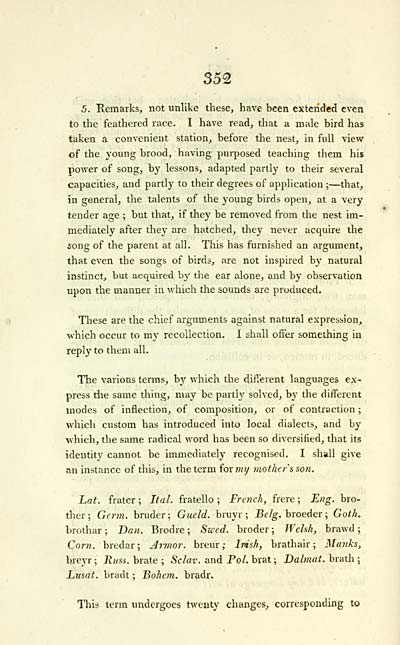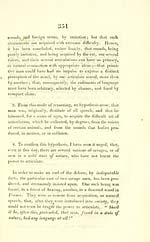Blair Collection > Celtic researches, on the origin, traditions & language, of the ancient Britons
(446)
Download files
Complete book:
Individual page:
Thumbnail gallery: Grid view | List view

352
5. Remarks, not unlike these, have been extended even
to the feathered race. I have read, that a male bird has
taken a convenient station, before the nest, in full view
of the young brood, having purposed teaching them his
power of song, by lessons, adapted partly to their several
capacities, and partly to their degrees of application ; — that,
in general, the talents of the young birds open, at a very
tender age ; but that, if they be removed from the nest im-
mediately after they are hatched, they never acquire the
song of the parent at all. This has furnished an argument,
that even the songs of birds, are not inspired by natural
instinct, but acquired by the ear alone, and by observation
upon the manner in -which the sounds are produced.
These are the chief arguments against natural expreshion,
which occur to my recollection. I shall offer something in
reply to them all.
The various terms, b}»- Avhich the different languages ex-
press tiie same thing, may be partly solved, by the different
modes of inflection, of composition, or of contraction ;
Avhich custom has introduced into local dialects, and by
Avhich, the same radical word has been so diversified, that its
identity cannot be immediately recognised. I shall give
an instance of this, in the term for mi/ mothers son.
Lat. fratcr ; Ital. fratello ; French, frere ; Eng. bro-
ther ; Gerin. brudcr; Gueld. bruyr ; jBe/g. broeder ; Goth.
brothar ; Dan. Brodre ; Swed. broder ; Welsh, brawil ;
Corn, bredar; Armor, breur ; Imsh, brathair ; Manks,
brcyr ; Russ. brate ; Sclav, and Pol. brat; Dalmat. brath ;
Lusat. bradt ; Bohem. bradr.
This term undergoes twenty changes, corresponding to
5. Remarks, not unlike these, have been extended even
to the feathered race. I have read, that a male bird has
taken a convenient station, before the nest, in full view
of the young brood, having purposed teaching them his
power of song, by lessons, adapted partly to their several
capacities, and partly to their degrees of application ; — that,
in general, the talents of the young birds open, at a very
tender age ; but that, if they be removed from the nest im-
mediately after they are hatched, they never acquire the
song of the parent at all. This has furnished an argument,
that even the songs of birds, are not inspired by natural
instinct, but acquired by the ear alone, and by observation
upon the manner in -which the sounds are produced.
These are the chief arguments against natural expreshion,
which occur to my recollection. I shall offer something in
reply to them all.
The various terms, b}»- Avhich the different languages ex-
press tiie same thing, may be partly solved, by the different
modes of inflection, of composition, or of contraction ;
Avhich custom has introduced into local dialects, and by
Avhich, the same radical word has been so diversified, that its
identity cannot be immediately recognised. I shall give
an instance of this, in the term for mi/ mothers son.
Lat. fratcr ; Ital. fratello ; French, frere ; Eng. bro-
ther ; Gerin. brudcr; Gueld. bruyr ; jBe/g. broeder ; Goth.
brothar ; Dan. Brodre ; Swed. broder ; Welsh, brawil ;
Corn, bredar; Armor, breur ; Imsh, brathair ; Manks,
brcyr ; Russ. brate ; Sclav, and Pol. brat; Dalmat. brath ;
Lusat. bradt ; Bohem. bradr.
This term undergoes twenty changes, corresponding to
Set display mode to: Large image | Transcription
Images and transcriptions on this page, including medium image downloads, may be used under the Creative Commons Attribution 4.0 International Licence unless otherwise stated. ![]()
| Early Gaelic Book Collections > Blair Collection > Celtic researches, on the origin, traditions & language, of the ancient Britons > (446) |
|---|
| Permanent URL | https://digital.nls.uk/75768801 |
|---|
| Description | A selection of books from a collection of more than 500 titles, mostly on religious and literary topics. Also includes some material dealing with other Celtic languages and societies. Collection created towards the end of the 19th century by Lady Evelyn Stewart Murray. |
|---|
| Description | Selected items from five 'Special and Named Printed Collections'. Includes books in Gaelic and other Celtic languages, works about the Gaels, their languages, literature, culture and history. |
|---|

